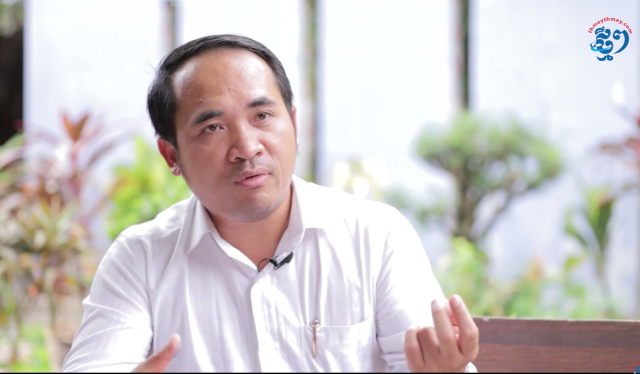The Art of Leadership in Cambodian Business

- Ky Soklim
- October 1, 2020 9:16 AM
An effective understanding of leadership is still missing in Cambodia, but Pech Bolene—founder of Westline Education Group—has written a book entitled “The Strategy of Leadership” and explains how employers need to be sensitive to social obligations, social changes and psychology.
Phnom Penh - In a country where social obligation is among the most crucial aspects of any persons, the art of leadership and management have to be able to creatively adapt with many social changes. Marriage, education and age gaps are some of the main social challenges that each and every businesses have to confront with in the nation of Cambodia. That is why an effective understanding toward the theory and the practice of “leadership” can help individuals and firms to avoid more mistakes. Mr. Ky Soklim, a senior journalist at ThmeyThmey News, interview Mr. Pech Bolene, the founder of Westline Education Group, on his newly published book “The Strategy of Leadership” and how leadership should be dealt with especially in the essence of social obligation, social changes and human psychology.
Ky Soklim: Let me begin the interview with a very simple question. To you, how is leadership defined exactly?
Pech Bolene: Upon writing this book, we have decided to use the phrase “The strategy of leadership” since it has a broader meaning. This phrase describes the ability of leading other people as well as leading yourself. A lot of people are enthusiastic in trying to lead others, but they may lack the vital principles of how to lead themselves.
Let me put it this way, by definition, leadership is the ability to become the model for others, to be able to influence others and to understand the feelings of others by making them happy and satisfied in a way that, in the end, it can bring you your desired achievement. Within the scope of this definition, it is ideal to know how to lead yourselves first so that you will have the ability to positively influence others which, in return, will make other people want to join your work.
Ky Soklim: Do you think many people know how to lead themselves, let alone leading others?
Pech Bolene: I think we can act. In the field of leadership, if we have a higher position, we have the right to lead. However, the real question is whether people who work under your leadership feel excited? Do they feel satisfied? Do they feel the work is sustainable?
I believe that in leadership, there has to be emotional support, emotional motivation, and training. These factors allow people under your leadership to develop. But, if the leaders themselves are still underdeveloped, still mentally and emotionally immature, in this case I would say that you’re just acting. Your leadership is fulfilled only for the sake of fulfillment. So, before leading others, it is crucial to be able to know how to lead yourselves first as a starting point.
Ky Soklim: For the lessons in your book, are they ideas you have creatively crafted by yourself or has it been influenced by other thinkers? What experiences and lessons have you acquired throughout your career?
Pech Bolene: The contents of this book have been gathered through our experiences in managing our employees, as well as through feedback and consultation from different companies over the last 20 years. The findings of this book are more suitable for managers or leaders of small and medium sized enterprises. Apart from our own experiences, we also get inspired by the ideas from other books as well.
Ky Soklim: You wrote that you have been a leader since the age of 17. Did you have trouble being taken seriously while you were so young and what were the challenges that confronted you then?
Pech Bolene: The hardest thing for me was to make people believe in me. For myself, I did not really know what I should do to achieve something remarkable, so I tried the best I could in the institution I was working with. Of course, there were issues along the way.
There were people between the ages of 30 and 60 years old who were working under my leadership. This was all part of my experience though and I have tasted both success and failure through this path.
Ky Soklim: What were the challenges that you have faced when you lead people from drastically different ages?
Pech Bolene: Up until the age of 20 or so, I still could not manage myself and was not fully matured. However, I learnt, step-by-step. The main thing that I was trying to acquire was the ability to control my own emotional state. To be able to have a firm control over my emotions, even though I was still at a relatively young age was hard, especially controlling my sense of pride. We can be proud of ourselves but we should not be projecting too much of our pride onto other people.
Ky Soklim: Do you feel that level of projected pride is something associated with youth or is it more personal than that? There are many elderly people who remain excessively proud of themselves.
Pech Bolene: I think it can be both. It usually occurs when someone suddenly receive a high ranking position in a firm. That someone may be prone to doing something without being able to contemplate far into the future. By believing that you are the leader, you think that your orders should always be followed by the people under your leadership, even though your leadership is devoid of an understanding of other people’s emotions.
Lots of new leaders fail to take into account the ideas and opinions of others, let alone make their team’s inputs feel worthwhile. It took me maybe four or five years to figure this out.
Ky Soklim: Based on this, is there a suitable age for leadership positions and does that vary from role to role? Do different fields of work and different sectors require a different level of maturity?
Pech Bolene: Well, in terms of emotional maturity, some people at the age of 19 or 20 can be very developed, but generally speaking, a person should be at least 26 or 27 years old, as well as emotionally matured in order to hold a position where they lead those older than them.
Nevertheless, it really depends on the work. When I was around 17 years old, I had to lead almost 100 employees. I was working inside the education sector 24 years ago, but it does not mean that a 20-year-old is unable to lead. Psychologists have shown that people who reach the age of 27 or 28 years old tend to understand more about working life.
Ky Soklim: Inside Cambodian society, there is a very popular view that people between the ages of 35 and 45 years old are more capable in handling managerial works. Is it right for our society to value the age of a person in leadership?
Pech Bolene: In the majority of cases, the general view in our society is true. However, when you try to measure the progress of a person’s maturity in correlation with their natural age and their tendency to understand the meaning of a working life, I think people from the age of 18 up until 25 are still learning about themselves, since their real personal identity is still developing.
Again, it’s not 100 percent, but it is the majority of cases. From the ages of 25 to 45 or even 50 years old, a person’s identity is usually found. The ability to construct your own identity should be made between the ages of 25 and 30 or 35 years old through experiences. During this part of life, a person should have pretty much enough experiences and a solid development in their career life. Generally, most people will be a lot more talented in their work starting from the age of 30 years old or so.
From 30 to 45 years old, people mainly function at peak productivity. Later than 45 years old, even though they still have lots of knowledge, their overall working performance will decrease or at least not improve much compared to their earlier age. From 50 years old, it should be time to become a wise person who is able to offer reliable consultation or life lessons to others.

Ky Soklim: For a leader aged between 30 and 40 years old, which scenario is easier; leading employees who are younger or older?
Pech Bolene: Through my observations, being in leadership between the ages of 30 and 40 years old may allow you to better understand both those who are below and above your age. However, speaking of leadership, it could be too different to lead someone over the 50 years of age. As we have observed both inside and outside our institution, this kind of age gap may present a number of issues in management.
Ky Soklim: How about the other way around? If the leader is over 50 and manages a team comprised of employees under the age of 30?
Pech Bolene: Well yes, this would be confronted with many issues. It does not mean that older leaders cannot lead a team of younger people. However, it demands the leaders to be able to understand the feelings and mindset of people much younger than them.
For younger people, the way they speak and think is different in accordance to the changes within society. In a leadership position which consists of a large team with a task that requires persistence and a sufficient understanding toward the society, leaders between the ages of between 35 and 40 are suitable for leading teams of younger people, as well as older than them.
Ky Soklim: Is leadership something which comes naturally or is it something that is learnt?
Pech Bolene: For me, I think it can be both. Some people are born with the talent of leadership. As a person working in education, I have observed a number of children who are independent and firm in their identity. They cannot be emotionally hurt easily, they have a sense of bravery inside them. Similarly, society also plays a part in developing these children’s ability to become leaders. No matter what your personality or attitude is, if you dedicate yourself to learning and are prepared to make positive changes, you can improve your leadership skills.
Ky Soklim: Despite that, are there people who are simply not cut out for leadership?
Pech Bolene: I believe that, sometimes, the personal traits people have from birth remain. On the other hand, it relates to the context and the social environment in which they grow up with such as their school or family. Sometimes, the social environment that they live through does not really teach them about being brave or being responsible. Their environment tends to make them rely on their parents.
So, when the children want to show their responsibility or if they want to express their own views, their efforts can be overshadowed or overwhelmed by their parents. Sometimes, children are born with a sense of leadership, but their environment may dissolve their abilities. What’s even more important is the environment that young people go through during the ages of 17 and 18 and the opportunities to gain knowledge they receive.
Ky Soklim: Every person has different ways of thinking, different knowledge, different capabilities and different positions in their field of work. As a leader, how do you define your own leadership position in each specific scenario that you face?
Pech Bolene: I don’t usually put too much value on someone’s age, since there are people from different ages who are working under my leadership. I emotionally consider all of them to be my relatives. Leading a person is like planting a tree or I would say planting a human being. It is not something easy. It depends on how you manage to choose the seeds and the kind of soil you have for your seeds.
Sometimes, the seeds—the employees—are actually very good. However, the soil—the working environment—is not that great, not that nutritious. Sooner or later, those seeds will not grow well inside the soil. Instead, if the soil is good, the seeds can grow little-by-little, but sometimes the seeds don’t fit the soil.
Ky Soklim: Does your book cover leadership in, say—politics, business, or even families?
Pech Bolene: In this book, I limit my explanation to that of SMEs and a bit of the management of NGOs, especially people who have a middle-to-high position in their firm. We also describe how employees can develop themselves and how the managers can increase their employees’ productivity and progress. I do not really focus on the leadership within the field of politics.
Ky Soklim: How different is leadership in the fields of politics, NGOs, private companies or even the leadership of a small community?
Pech Bolene: I would say that it is not too different from one another. They have their own institution to look after. One of the example is the transference of leadership—how to choose a suitable person to continue leading in the future. However, even though this is the case, the transfer of position in the political field and the transfer of position inside a private sector may not always be totally the same.
Ky Soklim: When do employees experience the most change? Is it before they get married, getting married or having children of their own? When do you think it is the hardest period for you to have control over your employees?
Pech Bolene: In general, human beings change their feelings on a daily basis. However, a huge shift is when they start to have a family of their own. For me, I usually prepare for this kind of change. For larger institutions, they even count the number of female and male employees, how many of them are still single and married or pregnant. This is a change in which we have to be cautious about. Being cautious means being able to negotiate as soon as they get married.
Everybody makes decisions about what to do after marriage. This is one of the very first questions that each and every newly-wed couples ask themselves after or even before their actual wedding. When they start a family, they think about having a house or a car or a family budget when they start having children. On the other hand, there is also another kind of change which occurs when some employees receive higher education, such as a master degree or a PhD. As leaders we need to be sensitive to the changes that take place in our employees’ lives.
Ky Soklim: What are the characteristics of becoming a good leader?
Pech Bolene: You need to take responsibility for your own products. Some people may only be responsible about the actions they undertake. We should see how our actions can influence the future of society. Plus, your ability to earn and maintain the trust of other people. We have to contribute a lot of good deeds and when trust is earned, we have to maintain that trust as carefully as possible. In order to maintain trust, we have to be very consistent in contributing good action.
Put in mind that through our leadership, people around us should develop. If not, that leadership might not be very sustainable in the long run. If a security guard in your institution works in this same position for five years straight without any obvious development, why should you feel proud of your institution’s capacity for developing people? It does not mean that we can help every single person, but at least we can help them as much as possible. The development of an institution is not always about financial growth, it is also about sustainability, stability and influence in society, as well as the well-being of your employees.
Ky Soklim: What are the important lessons you want people to take from your book?
Pech Bolene: Among them is the subject of philosophy. Philosophy is a collection of many good ideas, but somehow, not many people want to learn this subject. Psychology is also widely used in workplaces, as well as family environment. After that are the subjects of history and sociology. Sociology gives us the ideas of expectations. The expectation of what people will experience throughout their life and how that changes from different ages. These expectations might allow us to feel less surprised or disappointed about things we inevitably face in management.
Ky Soklim: In Cambodia and beyond, there are people who seek leadership positions without wanting to take on the responsibilities of leadership, how should people cope with that?
Pech Bolene: I believe that there are many people who regularly think like this. Leadership should, of course, come with a sense of proportional responsibility. In this case, our society should be looking away from materialism, social status and especially the outer-value. Before, our society placed more importance in the inner-value of a person. The outer-value can be seen through the materials that a person owns and the attitude a person might hold in order to project their own status. All in all, the inner-value of a person is not as the same as the outer-value.
When someone attains a higher position, they party. But, do they pay good attention toward their duty and their work? Sometimes not really. Both responsibility and accountability should be applied to the actions we take and the products we make.
There is another thing that should be taken into account—many business owners don’t understand their employees. Likewise, many employees don’t understand themselves. They think that they should be promoted to a higher position.
For example, among five employees, there is one employee who works really well, but being more productive than your surrounding peers does not mean that you automatically have the qualities of a leader. Let’s say a mechanic who works well on his duties, of course he is good at technical work, but it does not mean he has the ability to manage other mechanics.
When you become a leader, you don’t really use your technical skills anymore. You start using leadership skills which are more about the ability to understand yourself and others, not just the technical aspect of the work at hand.
In this example, the firm loses one very competent employee and gains an incapable leader of the team. With this kind of incapable leader, another thing to worry about is the instability of the entire team. By playing safe, in this scenario, you can promote a dedicated employee to become a senior employee, but they will not automatically be a leader who can lead the entire team.















